Alexander took over Philip's throne at the age of 20. He had been a commander in the army since he was 16. Upon becoming a commander, he cut his shoulder-length hair and ordered his soldiers to shave their beards. This, he said, would keep enemy soldiers from grabbing them in close combat.
Alexander was physically strong and good-looking. He also had developed his mind. For three years, Aristotle had taught him literature, political science, geography, and biology. Because of this, Alexander included philosophers and scientists in his army.


THE WORLD IN SPATIAL TERMS
At the time of his death, Alexander the Great ruled over much of the classical world. Why do you think Alexander founded his capital, Alexandria, where he did?
The scientists collected plant and animal samples from newly conquered lands and sent them to Aristotle for examination.
Alexander was a great general who feared nothing. He crushed the Persian Empire and then marched as far east as northern India. He would have gone farther, but his troops refused. In the course of his conquests, Alexander covered more than 22,000 miles, or over 35,200 kilometers, from the Nile to the Indus rivers. Through all that territory, he never lost a battle.
Alexander's Empire Alexander had a dream of a worldwide state in which all people would live together in peace. He wanted to bring unity and justice to his empire.
Alexander believed the only way to achieve his goal was to unite the Macedonians, the Greeks, and the Persians. He began by taking Persian soldiers into his army. Next, he married a Persian woman and had 80 of his leading army officers marry Persian women, too. Then, he began to dress in Persian fashion and to follow some Persian customs.
One custom was for rulers to claim they were gods. So, Alexander claimed he was a god and insisted that people treat him that way. The Macedonians and Greeks, however, refused to do so. The Greeks also objected to equal treatment for the Persians. They looked down on all people who did not speak Greek or


Follow Greek customs. They called such people barbaroi (bar' buh roi), from which the word "barbarians" comes. Because of such feelings, Alexander's attempt to achieve unity among the people in his empire was not successful.
Alexandria During his rule, Alexander founded about 70 cities, 16 of which were named Alexandria (al ig zan' drei uh) after himself. He encouraged Greeks and Macedonians to settle in the new cities, which were scattered throughout the empire.
The most noted Alexandria was in Egypt. Within 70 years after its founding, it had become a center of trade and learning. Greeks from throughout the eastern Mediterranean came there. They wanted to make the most of its economic opportunities and to be a part of its intellectual and social life.
Alexandria had two great harbors. They were protected by breakwaters, or barriers that break the force of waves. A lighthouse 400 feet, or about 122 meters, tall dominated the harbors. It is considered one of the Seven Wonders of the Ancient World.
Looking out over the chief harbor was a palace and a school with a library. The school was known as the Museum. It became a center for poets, writers, philosophers, and scientists. The library had the largest collection of books in ancient times. There, Euclid (u' kluhd) wrote his geometry book. There, Eratosthenes (er uh
WJ Reading Check
What English word is derived from barbaroi?

Student Web Activity
Visit the Human Heritage Web site at humanheritaae. alencoe. com and click on Chapter 12-Student Web Activities to find out more about Alexandria.


LIGHTHOUSE OF ALEXANDRIA The lighthouse of Alexandria was one of the Seven Wonders of the Ancient World. It towered over Alexandria's two excellent harbors. A fire on top provided light to guide ships into port. Why was Alexandria also considered a center for learning?

Greek Translation In
About 250 B. C., Jewish scholars in Alexandria translated the Hebrew Bible into Greek, a version known as the Septuagint. The Eastern Orthodox Church still uses the Septu-agint version of the Old Testament.
Alexander’s Hero
The mother of Alexander the Great told her son that Achilles, a hero of the Trojan War, was his ancestor. He learned Homer's Iliad— which tells Achilles' story— by heart and always carried a copy of it with him.

ALEXANDER THE GREAT Alexander conquered tremendous amounts of territory. His empire stretched from Greece to northern India. This painting of Alexander shows him leading his army ashore in Asia Minor and claiming all lands to the east as his own. Why was Alexander unable to continue his conquests beyond India?
Tahs' thuh neiz) reasoned that a ship could reach India by sailing west from Spain. There, Archimedes (ar kuh meid' eiz) and Hero (he' rio) invented several machines.
End of the Empire In 323 b. c., when Alexander was in Babylon, he became ill and died. He was 33 years old and had ruled for 13 years. His body was wrapped in gold and placed in a glass coffin in the Royal Tombs of Alexandria, Egypt. After his death, Alexander became a romantic legend. More than 80 versions of his life have been written in more than 20 languages.
After Alexander's death, fights broke out over who was to rule the empire. The areas Alexander had conquered in India returned to their original rulers. Three of Alexander's generals divided the rest of the empire among themselves. Antigonus (an tig' uh nuhs) became king of Macedonia. Ptolemy (tahl' uh mei) established the dynasty of the Ptolemies in Egypt. Seleucus (suh lu' kuhs) formed the Seleucid Empire in Persia. Athens and

Sparta again became independent city-states. Most other Greek city-states banded together into one of two leagues, but neither league had much power or importance.
Greek cultural influence, however, became stronger than ever after Alexander's death. The rulers who took Alexander's place adopted Greek as their language and used Alexander's titles. They even used his portrait on their coins.
Trade grew. From Africa and Asia came spices, ivory, incense, pearls, and rare woods. From Syria and Egypt came glass, metals, and linen. From Greece came olive oil, wine, and pottery. From Sicily and Egypt came wheat.
The cities that had been part of Alexander's empire now existed chiefly for trade and grew along with it. City officials made their laws, language, calendar, and coins Greek. Teachers brought Greek customs and ideas into schools. Merchants and bankers used Greek methods to run their businesses.
V

E
Fdds..
Greek Discoveries
Greek scientists at Alexandria made several key discoveries. Eratosthenes calculated the earth's circumference to within 1 percent of its actual size. Archimedes invented a watering tool that Egyptian farmers used for nearly 2,000 years.
Hellenistic Influence The columns of an ancient Greek temple (left) influenced the style of this United States government building (right). Why do you think the Hellenistic style of art and architecture is often used on present-day government buildings?

The Greek city-states, however, were never the same again. Although they kept their political independence, they could not gain back the power of the past. In time, economic conditions grew worse. Great factories, or places where goods are made, had been built in the new Hellenistic cities. Greek manufacturers now found they could not compete with these factories. Because of this, more and more young Greeks emigrated (em' uh grat ed), or left one place to settle in another. Population in the Greek city-states fell. There were not enough people to work the land, and many farms once again became wilderness. By 146 B. C., most of the Greek city-states were under Roman control.
¦y Reading Check
What are factories?
What happened to city-states when many young Greeks emigrated?
D. ll I. ULLI LLLI-l. Lai. l l I I 11M. LH..1ULlJ
1. Define: barbaroi, factories, emigrated.
2. Who was Alexander the Great?
3. What conquests did Alexander make?
4. How did Greek influence continue to grow and spread after Alexander's death?
5. Forming Conclusions How successful would Alexander's dream of unit-
P IB
Ing the world in peace be today? Explain.
6. Draw a time line like this one, and use it to show the major events in the life of Alexander the Great.
I! r n I n I I I • ' 11 i i i i i f iiiriTi i r f 11 n 11 n r i rii m i i i i i
Chapter Summary & Study Guide

1. Philip II believed it was his destiny to unify the Greek city-states and spread Greek culture.
2. Philip II was able to conquer Greece in 338 B. C.
3. When Philip II died in 336 B. C., his son Alexander took over power.
4. Alexander was a great general whose conquests stretched from the Nile to the Indus.
5. Alexander tried without success to unite the Macedonians, the Greeks, and the Persians.
6. The most famous city founded by Alexander was Alexandria, Egypt.
7. After Alexander died in 323 B. C., his empire was divided among three of his generals.
8. Despite Alexander's death, Greek cultural influence became stronger.
9. Although the Greek city-states again became independent following Alexander's death, economic conditions in Greece grew worse.
10. Most Greek city-states were under Roman control by 146 B. C.

Self-Check Quiz
Visit the Human Heritage Web site at humanheritaae. alencoe. com and click on Chapter 12—Self-Check Quiz
To assess your understanding of this chapter.





 World History
World History









